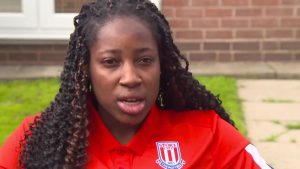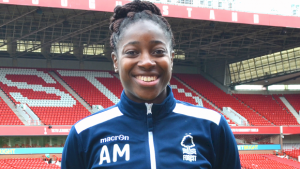Alena Moulton (Head Coach of Stoke City FC Women) who is qualified to UEFA A level and a trailblazer in women’s football took time out to speak to the young girls of Billingham Synthonia Ladies on a zoom call. Alena has been involved with England development teams. She has an excellent understanding of regional talent pathways, including working knowledge of how players succeed in a performance environment.
This was a great opportunity for Synners girls to get a chance to find about Alena’s journey in football. They also got to hear about what it takes to be successful higher up the women’s football pyramid.

Coaching
After a break in playing football for 3 years Alena explained she made a decision to become a football coach at a young age. It was clearly something Alena was passionate about and she certainly talked about an holistic approach to coaching. Her style also included some subtle differences in working with female footballers.
Talking about players at a development level Alena mentioned that it was important to know what they wanted out of football. Sometimes coaches, other players & family may assume the player wants to play at the highest level.
Players can get caught up trying to please others. Alena encouraged honest conversations between players & coaches that would help identify the intentions of young players. This would lead to the coach / club being able to provide suitable challenge & support for players.
Alena came across very knowledgeable about the game but her approach to working with people is what I personally think will lead to her being successful at a higher level than tier 3 of women’s football.
Minutes on the pitch
On the subject of player development and playing at various levels of the women’s football pyramid Alena was quick to point out that she believed it is no good going to a team as a player, if you are going to spend more time on the bench. That isn’t to say players shouldn’t be patient but Alena believed there are many benefits to playing at a level where learning can take place from actual playing.
It is important for players to be getting minutes, whatever level they are playing at.
Alena mentioned the importance of organisation, players knowing where they need to be on the pitch, with the ball, without the ball and reactions to transitions. Organisation at the back when attacking and organisation at the front when defending.
Characteristics of Players
Alena got her break in coaching at young age with Nottingham Forest Ladies and has a set of values that she believes coaching staff and players should be aware of when working with each other. Some of the key values Alena expects players to have are honesty, trust and respect. She believe it is important how players talk / communicate with each other.
It is important to have a positive energy in the squad / dressing room. It makes a managers / coaches job harder when there is negativity amongst players.
As a coach, Alena recognises there will be times she hasn’t got the answers for player. This means Alena wants players to show they are adaptable, willing to learn, problem solvers and not frightened of changing it.
Players need to be adaptable during games, as a coach I can’t always make every decision for them.

Team Sport v Individual Sport
There was an interesting discussion about team sports v individual sports with Alena emphasising the importance of players in team sports having togetherness and supporting each other. Alena mentioned that in team sports players are more likely to blame other players when things go wrong. Evaluating their own performance was critical for player development.
Another important point mentioned was the individual elite athlete competes on their own and has nowhere to hide if things go wrong so this could contribute to their attitudes towards self reflection. Their strength to not go missing as often while competing, where elite athletes in team sports can be supported by others when things aren’t going right. While supporting others can be a positive within a team, it can also be a negative if the individual doesn’t recognise where they need to improve and/or shows a lack of willingness to improve.
If there is a need to challenge each other, it is important that it is done respectfully.
Social Wellness
Alena said that players in women’s football enjoy the social environment, possibly more so than in men’s football. This was identified as an important area and one for coaches to consider alongside technical, tactical work etc.
Training & Fitness
Especially when players and coaching staff are not FT Alena stressed the importance of players taking responsibility for their own development away from team training sessions, this included fitness / S&C.
Players have to take responsibility for their own fitness away from team training sessions, especially when the club PT.
Specifically talking about players moving up through the women’s football pyramid Alena highlighted some key differences and gave the Synners girls an insight into what to expect as they progress.
Higher up the pyramid the game is quicker, a faster pace, less time to recover and the quality is better.
Player Development – Reflections
Alena was keen on players having ownership of their own development. This is something that the management and coaching staff at Synners have also been focusing on. It was acknowledged that learning was a big part of the game for any player, especially young players starting their journey in women’s football.
The importance of players developing game management, having 2-way communication when it came to their development plans and the benefits of reflection diaries was something Alena suggested players might want to have a look at.
Questions
The girls of Synthonia got a chance to ask questions and get some valuable advice. Questions asked included scholarships in USA, coaching journey advice and how to react to starting badly in games.
Alena gave some great advice although now needs to be aware when the girls play her team they won’t be phased if they go a goal down!
